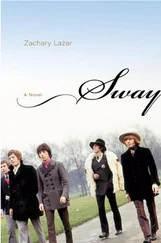Zachary Jernigan - No Return
Здесь есть возможность читать онлайн «Zachary Jernigan - No Return» весь текст электронной книги совершенно бесплатно (целиком полную версию без сокращений). В некоторых случаях можно слушать аудио, скачать через торрент в формате fb2 и присутствует краткое содержание. Год выпуска: 2013, ISBN: 2013, Издательство: Night Shade Books, Жанр: Старинная литература, на английском языке. Описание произведения, (предисловие) а так же отзывы посетителей доступны на портале библиотеки ЛибКат.
- Название:No Return
- Автор:
- Издательство:Night Shade Books
- Жанр:
- Год:2013
- ISBN:9781597804561
- Рейтинг книги:3 / 5. Голосов: 1
-
Избранное:Добавить в избранное
- Отзывы:
-
Ваша оценка:
- 60
- 1
- 2
- 3
- 4
- 5
No Return: краткое содержание, описание и аннотация
Предлагаем к чтению аннотацию, описание, краткое содержание или предисловие (зависит от того, что написал сам автор книги «No Return»). Если вы не нашли необходимую информацию о книге — напишите в комментариях, мы постараемся отыскать её.
No Return — читать онлайн бесплатно полную книгу (весь текст) целиком
Ниже представлен текст книги, разбитый по страницам. Система сохранения места последней прочитанной страницы, позволяет с удобством читать онлайн бесплатно книгу «No Return», без необходимости каждый раз заново искать на чём Вы остановились. Поставьте закладку, и сможете в любой момент перейти на страницу, на которой закончили чтение.
Интервал:
Закладка:
His body ached so thoroughly that concentration could not locate a single injury more agonizing than the rest. Lifting a knee, flexing his pectorals, or balling his toes resulted in intense pain. His right shoulder clicked every time he rolled it, and stars flared before his eyes if he tipped his head too far back. His right finger was broken. He suspected his right clavicle and several of his ribs were cracked. The stiffness of his suit alone kept his torso upright and his legs from buckling underneath him.
It had not been so bad, after the first few fights. He had won them handily enough, but this was hardly a surprise during the winnowing stage. The odds fell in a senior fighter’s favor. By the eighth round, however, experienced fighters were finally being pitted against one another, and the winners became harder to predict. Men and women who had worn suits for decades traded punches powerful enough to crush elephant skulls, dodged and deflected attacks too fast for the eye to follow, and died suddenly, often before the crowd registered the killing blow.
Victors and dead men were separated by a blink of the eye. The goal was not to teach a lesson, but to kill efficiently. Retribution or punishment required keeping one’s opponent alive—a condition few smart fighters would tolerate. It was too easy to misjudge another combatant’s injuries and lose the upper hand. To kill a suited man was not easy, after all. Even mortally wounded, a would-be loser could still strike.
No weapons other than the elder-cloth suits were allowed. None were needed. Sufficiently skilled in the martial arts, fused to his suit to the degree that it seemed indistinguishable from flesh, a man like Vedas became a weapon of awesome power. Only magic posed a significant threat to the brothers and sisters of Black and White orders, but magic too had been outlawed from the tournament.
Aching, struggling to remain upright, Vedas gave up on centering his thoughts and allowed himself to wonder what surprises the man Grey had in store for him. Perhaps he would fight like Ria, the thin elderwoman Vedas had fought in round six—a flurry of deceptively wild punches and knee thrusts, a confusing fusion of techniques. Or maybe he would fight like Osuns, the immense hulk of a man Vedas had fought in the tenth round—a wall of flesh taking punishment without apparent damage, only to launch an offensive so carefully timed it nearly took his opponent’s head off.
Or most troubling of all, would Grey fight like Jaffe, the small brother Vedas had nearly lost to in round fourteen? Unable to land a single blow, thrown around the pit like a ragdoll, Vedas had become desperate and thrown sand in the man’s eyes. Many in the crowd had booed, but an equal number had cheered when Vedas killed the man.
He carried the guilt of the act with him still. The thought of winning the tournament under similar circumstances filled him with shame, for he knew he would make the same decision again. He had rewritten the speech, and intended to read it.
But who would listen to the words of a coward?
Doubt settled upon his shoulders, weighting his bones so that he sagged even more upon his stool. He might not live to read the speech. His success had never been assured. He could be the lesser man. Had he traveled so far only to die alone? Obviously, this was the case for all but one of the fighters. Why had the thought of being defeated seemed so preposterous? Was he really such a fool as to believe himself invincible, or had he simply pushed his fears to the side for fear of confronting them?
Die alone , he thought.
The two words settled cold and solid in his gut. He clasped his hands together to stop their shaking. Deeper than the exhaustion, heavier than the doubt, the hope he had suppressed welled up within him: a terrible feeling, like standing on the edge of the Steps, waiting for the wind to either tip him back onto land or carry him out over the sea.
He fought the urge to raise his head, and failed. The whites of his eyes reflected the scant light. A brother met his gaze and took it for an invitation to approach. Vedas shook his head, and the man faded back into the crowd.
The frown deepened on Vedas’s face as he tried to peer through the bodies. He shifted on his stool like a man in great discomfort. Finally, he stood, craning his neck to see into the shallow bowl of the covered arena. He searched the highest stands, the fringes and the entrances. A persistent person could get into the tent, but could not shoulder into the ranks of white- and blacksuited orders, who by right sat close to the action.
He searched for Churls, and came up empty.
‡
“Tell me you will,” he had said, and she told him she would.
Leaving her in the whorehouse was not an easy thing to do. He regretted it the moment he walked out the door. She wanted him to stay—this much was clear, even to someone as unused to companionship as Vedas. After months traveling together, he knew her better than he had known any woman, any person, in thirty-four years of life. Still, there was mystery to her, words left unspoken between them. She possessed urges that both scared and compelled him.
He felt crippled by his inexperience. Did she know he had never been with a woman? Likely, she had guessed as much. Did she suspect he had never kissed a woman, never held a woman’s hand in romance?
Anyone would laugh at his naivety.
Yet somehow he knew that, if given the opportunity, Churls would not laugh. The woman could be coarse, but she had never been cruel. She listened well when he ventured to tell her about his past. She had not chuckled or rolled her eyes while he talked of Julit Umeda’s parents, halting and awkward though his account was. Sometimes, her expression appeared to convey not only sympathy, but a deep understanding.
Of course, sharing on this level occurred with regularity for other people, yet Vedas had rarely experienced it. He wondered, if he had held her gaze in the whorehouse, lingered just a moment more in her company, might she have shown him just how much she empathized?
With every step he took away from her, the more tenuous their connection seemed. It stretched, turning their months together into nothing more than a convenience, a rational arrangement they had arrived upon to keep themselves safe.
The road was lonely, after all. They had grown closer out of boredom. Perhaps he had deceived himself in everything.
Before long, this became his conviction. If she arrived at the tournament, she would be watching out of obligation and nothing more. She would congratulate him, buy him a drink, and say she wanted to see him at her upcoming fights. They would agree to meet up again but attach no importance to the appointment, like all mild friends did in the same situation. Bonds extended only so far.
He reached the Black Suit camp, where his brothers and sisters welcomed him in full companionship. They shared food and space. They introduced themselves and exchanged histories, began songs and dancing. More than a few offered their flesh, but Vedas felt no temptation to accept. Sharez, a lithe northern Castan woman who had caused her suit to grow spiraling horns on her head, made a seam split in her suit, revealing her womanhood. Briefly stricken immobile, he watched as she took his hand and guided it to her.
“Hey,” she said when he snatched it away. “Why not enjoy yourself?”
She was beautiful, and he answered honestly: “I don’t know.”
Though he knew abstinence was not required or even normal in most orders, the sexual abandon of the camp shocked him. He forced himself to interrupt an intimate discussion in order to borrow a razor, shaved his face and head, and then went to bed alone, apparently the only one to do so.
In the White Suit camp, the situation was undoubtedly much the same. Celebrations had a universal nature. For the first time, Vedas understood how odd it was that he had never formed a sexual relationship, never experimented beyond masturbation. Surely, he did not still carry the wounds of youth! He had never looked upon the act of sex with revulsion. Instead, he simply did not consider it an option. But what if he had stayed with Churls? Would she have rented a room, shown him the error of his thinking?
Читать дальшеИнтервал:
Закладка:
Похожие книги на «No Return»
Представляем Вашему вниманию похожие книги на «No Return» списком для выбора. Мы отобрали схожую по названию и смыслу литературу в надежде предоставить читателям больше вариантов отыскать новые, интересные, ещё непрочитанные произведения.
Обсуждение, отзывы о книге «No Return» и просто собственные мнения читателей. Оставьте ваши комментарии, напишите, что Вы думаете о произведении, его смысле или главных героях. Укажите что конкретно понравилось, а что нет, и почему Вы так считаете.












